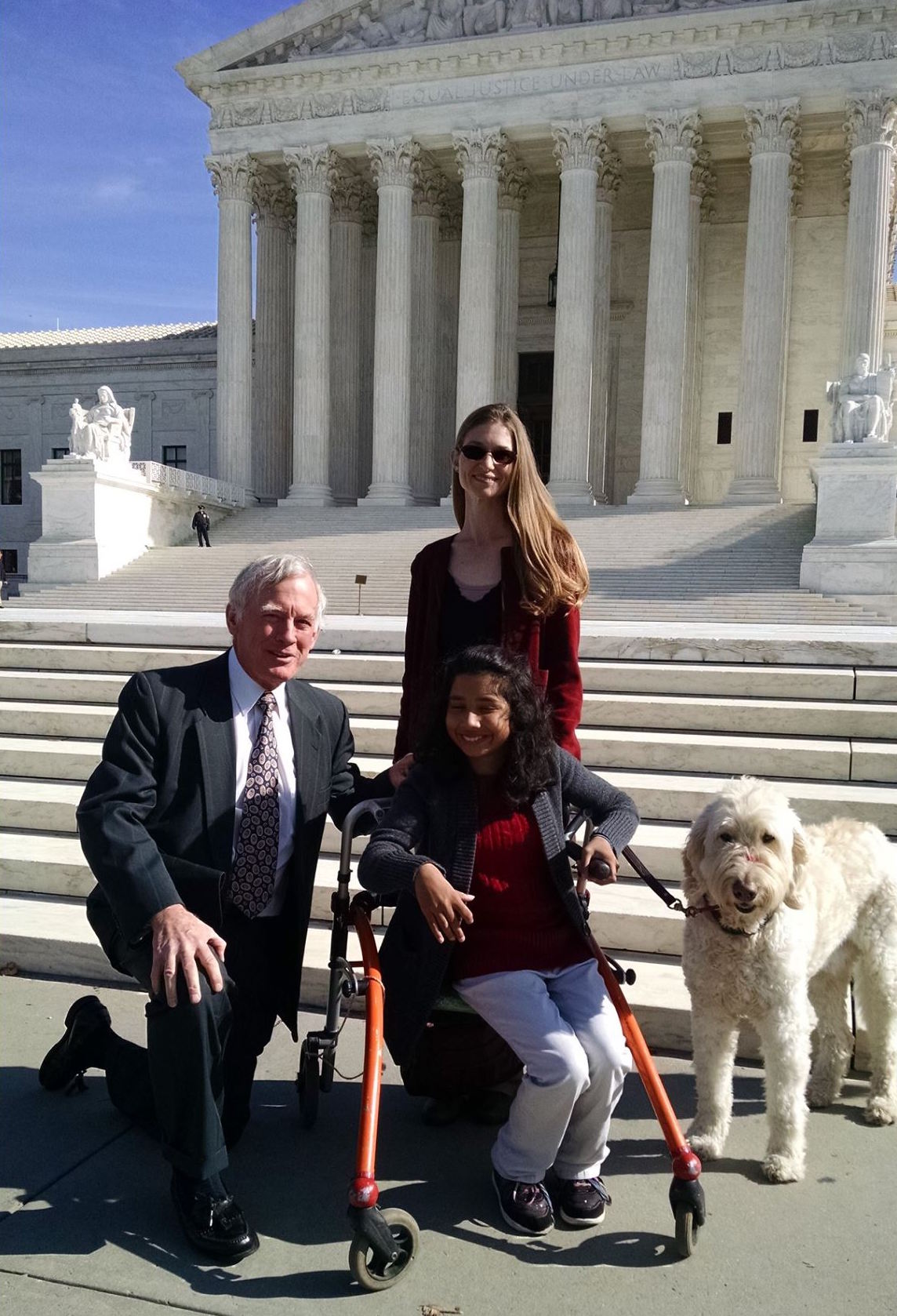Print this page
Fry v. Napoleon Comm. Sch. Dist.
Family Appealed Decision in Discrimination Case to Supreme Court
(discrimination, accommodation, service dog, failure to exhaust)
by Pete Wright

Wrightslaw Note: On February 22, 2017 by a unanimous 8-0 decision, SCOTUS reversed the Court of Appeals decision and ruled in favor of the parents. The Court explained that "We hold that exhaustion is not necessary when the gravamen of the plaintiff's suit is something other than the denial of the IDEA's core guarantee - what the Act calls a 'free appropriate public education.'"
In Fry v. Napoleon, 788 F.3d 622 (6th Cir. 2015), the Court of Appeals for the Sixth Circuit upheld a ruling by a Michigan federal court that Elhena Fry's parents were required to request a special education due process hearing, i.e., exhaust their administrative remedies, before they could file suit for monetary damages under the ADA and Section 504. This ruling widened a split among circuits about requiring parents to exhaust administrative remedies under IDEA, even though the relief they sought was not available under the IDEA.
In October 2015, the parents appealed this adverse decision to the Supreme Court. In January 2016, the Supreme Court asked the Solicitor General to write a brief about whether they should hear this case.
In May 2016, the Solicitor General submitted the brief and advised the Supreme Court that:
A. The court of appeals' decision was incorrect;
B. The courts of appeals are split about how to interpret the exhaustion requirement in IDEA; and that
C.
The question is important and recurring, and the Court should resolve it in this case.
Briefs were filed by the parents, (the Petitioners) and by Napoleon Comm. Sch. District (the Respondents.)
Numerous other Amicus (friend of the Court) briefs in support of the parents were filed by the United States, former top administrators of the U. S. Dept. of Education (Thomas Hehir, Melody Musgrove and Madeleine Will), Autism Speaks, the Council of Parent Attorneys and Advocates, the National Disability Rights Network, Psychiatric Service Dog Partners, Inc., the Hon. Lowell P. Weicker, Jr., and the states of Illinois and Minnesota.
The National School Boards Association filed a brief on behalf of the Respondents.
To view all of the Briefs filed in the case, please go to the "SCOTUS Blog" website at: www.scotusblog.com/case-files/cases/fry-v-napoleon-community-schools/
My Thoughts about Oral Argument
I was at Oral Argument.
Moments after Samuel R. Bagenstos began his opening statement on behalf of the Frys, he was interrupted with questions, non-stop. With the body language of the Justices and nature of the questions, I began to feel that it would be quite hard to obtain five votes from the eight Justices to reverse the decision of the Court of Appeals.
However, when the Respondent's attorney was asked questions, the momentum appeared to shift in favor of the Frys. At one point, Justice Kagan asked him a question about whether a child with a disability who did not have an IEP, still had to use the IDEA due process procedures. The attorney sidestepped the question. Justice Kagan returned to it and it was again sidestepped.
That was not unnoticed by the Justices. I saw several of them lean forward and begin to pay close attention to the questions and answers. By the end of the rebuttal closing by Bagentos, I felt that the momentum was in favor of the Frys.
If a child has a disability but it does not adversely affect educational performance, typically the child is not entitled to an IEP, but does have the protections of ADA and Section 504. An example is a child with an episodic condition, such as epilepsy, diabetes, asthma, peanut allergies, etc.
If access to educational opportunities is denied for reasons related to the disability (child is in a wheelchair, classroom on second floor, no elevator) or if there is discrimination related to the disability, generally that is not an IEP issue, but may be a violation of 504 / ADA.
In that instance, per the earlier, appealed, ruling at the Sixth Circuit in Fry, the parents still had to pursue a spec ed due process hearing under IDEA even if there was no relief available under IDEA, such as a revision to a non-existent IEP.
If a child is physically abused by school staff and that abuse is in part because the child has a disability, in some parts of the country the parents could go straight to court and seek an injunction and damages under 504/ADA against the school district. But that remedy is not so in other parts of the country where a Court of Appeals has held that you have to exhaust, even on a non IDEA / IEP issue.
If a "normal, regular ed" child has no form of a disability under either IDEA or Section 504 / ADA, then that child does not have to exhaust the administrative remedies contained in IDEA 2004. That difference smacks of discrimination on its face with exhaustion required for the child with a disability but not for the other child.
This exhaustion statute has been used to dismiss many claims that are not special ed relief cases and the Courts around the country are all over the place. When do you have to exhaust under IDEA and when is it not required? The standard used to be if it was futile to exhaust or if the due process hearing officer / administrative law judge could not provide the requested relief, then you did not have to exhaust.
In recent years, Courts have been moving away from that standard, rulings around the country are inconsistent and unclear, thus the US Supreme Court has to address it.
Below is a link to some photos taken on the steps of the Courthouse that morning after Court.
Ehlena Fry and her mother, Stacy, being interviewed by NPR's Nina Totenburg.
Nina, up close, with Ehlena.
Pete with the Frys.
Mickey Stuart, her husband, Mark (on the right), their son, who traveled from Redmond, WA and other families with service dogs.
Attorney members of COPAA, in order, left to right - Gary Mayerson, Ron Hager, Tauna Szymanskii, me, Michele Kule-Korgood, and Selene Almazan.
Facts
Ehlena Fry has a severe type of cerebral palsy that affects her legs, arms, and body.
"In 2009, when she was five years old, E.F. obtained a service dog prescribed by her pediatrician to help her live as independently as possible . . . E.F's pediatrician and family intended to have Wonder accompany E.F. at all times to facilitate her independence and ensure that she and Wonder would bond after training."
"In October 2009, Ehlena's parents acquired Wonder, a Goldendoodle that was specially trained to help Ehlena with balance, retrieve dropped items, open and close doors, turn on lights and perform many other tasks. Wonder is hypoallergenic and is trained to stay out of the way when he is not working."
"Respondents Napoleon Community Schools and Jackson County Intermediate School District refused to permit E.F. to attend school with her service dog . . . As a result, E.F. was forced to attend school without her prescribed service dog from October 2009 to April 2010.'"
After months of mediation, the school allowed Wonder to accompany Ehlena for a 'trial period' but did not allow Wonder to work. Instead, ". . . the school required the dog to remain in the back of the room during classes, forbade the dog from assisting E.F. with many tasks he had been trained to do, and banned the dog from accompanying and assisting her during recess, lunch, computer lab, library time and other activities. After the trial period, the School District refused to permit Wonder to accompany E.F. to school." (Facts from Petition for Certiorari)
After the "trial period," the school district again refused to allow Wonder to accompany E.F. during the next school year. Initially, Ehlena's her parents home schooled her. Later, they placed Ehlena into a different school in a different school district where Wonder was allowed to accompany and assist Ehlena.
Relevant Law
The parents brought this suit under the ADA and Section 504 of the Rehabilitation Act (504), not under The Individuals with Disabilities Education Act (IDEA). Why?
"The IDEA
provides limited rights and protections and does not guarantee 'equal' educational opportunities . . . The ADA, by contrast, is an anti discrimination statute … that requires equal opportunity . . . to avoid discrimination, public entities are required to make reasonable modifications to rules, policies or practices."
"Because of the importance of service animals to ensuring equal access for many people with disabilities, the Department has interpreted the statute's 'reasonable modifications' language to require that . . . individuals with disabilities shall be permitted to be accompanied by their service animals in all areas . . . This rule applies to all state and government entities . . . Unlike the IDEA, the ADA also provides damages liability."
Earlier Rulings and Opinions
In 2010, after the School District's refusal to permit Wonder to accompany E.F. to school, her parents filed a complaint with the Office for Civil Rights (OCR) of the the United States Department of Education; their complaint alleged that the School District had violated the ADA and Section 504 by refusing to permit E.F. to use her service dog at school.
In 2012, after an investigation, OCR issued a 14 page decision which concluded that the School District had violated the ADA and the Rehabilitation Act."

Ehlena's parents brought suit brought suit under the Americans with Disabilities Act and Section 504 of the Rehabilitation Act "to seek damages for the social and emotional hardship caused by the Defendant school district's refusal to permit E.F.'s trained service dog to accompany her to school." The parents did not request a special education due process hearing under IDEA.
The school district filed a motion to dismiss, claiming that the parents' "failure to exhaust their administrative remedies under IDEA mandated dismissal."
The district court granted the district's motion to dismiss on the grounds that the Frys' claims necessarily implicated E.F.'s IEP, so the IDEA's exhaustion provision required the Frys to exhaust IDEA administrative procedures before they could bring suit under the ADA and Rehabilitation Act.
The Frys appealed, arguing that the IDEA exhaustion provision does not apply because they are not seeking relief provided by IDEA procedures.
Hearing Officers and Administrative Law Judges who conduct due process hearings are not allowed to award damages so many courts consider the requirement to request a due process hearing to be futile and unnecessary.
In a 2-1 split decision, the court of appeals upheld the district court's dismissal.
"On January 10, 2014, the district court granted the defendants' motion to dismiss pursuant to Rule 12(c), finding that the IDEA's exhaustion requirements applied to the Frys' claims and dismissing them without prejudice. The court noted that although the Frys did not specifically allege any flaw in E.F.'s IEP, if she were permitted to attend school with Wonder, that document would almost certainly have to be modified in order to articulate the policies and practices that would apply to the dog."
In a strong dissent, Judge Daughtrey wrote:
"The disability discrimination at issue is a text-book example of the harms that Section 504 and the ADA were designed to prevent, and the claims should not have been dismissed essentially because the victim of the discrimination was a school-aged child."
"The majority proposes to affirm the district court's order dismissing this civil rights action alleging violation of Section 504 of the Rehabilitation Act and Title II of the Americans with Disabilities Act (ADA), based on its conclusion that 'the specific injuries the [plaintiffs] allege are essentially educational' and, therefore, subject to administrative exhaustion under an entirely separate statute, the Individuals with Disabilities Act (IDEA). Because I conclude to the contrary that the claim here is non-educational in nature and that the IDEA's exhaustion provision was improperly invoked by the district court, I respectfully dissent."
"Moreover, even if the accommodation sought could be considered 'educational,' the fact that school policy would permit a 'guide dog' on campus, but not a certified 'service dog,' suggests why an attempt at exhaustion of administrative remedies would be futile in this case and should be excused."
Appeal to Supreme Court
In October 2015, the Frys appealed to the U. S. Supreme Court.
On January 19, 2016 the Court invited the Solicitor General to file a brief expressing the views of the United States.
Solicitor General's Brief: Court of Appeals Decision incorrect, Courts Split, Question Is Important And Recurring, Supreme Court Should Resolve Question In This Case (May 20 2016)
On May 20, 2016, the Solicitor General filed a brief for the United States in the Fry case:
"In the view of the United States, the petition for a writ of certiorari should be granted." (emphasis added)
"The court of appeals incorrectly affirmed the dismissal of petitioners’ ADA and Rehabilitation Act claims for failure to comply with the IDEA’s exhaustion provision, 20 U.S.C. 1415(l). The court’s decision is at odds with the plain text of Section 1415(l), and it deepens an entrenched circuit split over the proper interpretation of that provision. The question presented raises an important and recurring issue that has significant consequences for children with disabilities who seek to vindicate their rights under federal anti-discrimination statutes. This Court should grant certiorari to resolve the split and reverse the decision below."
- The Court Of Appeals’ Decision Was Incorrect
"The court of appeals erred in holding that petitioners’ claims were properly dismissed under Section 1415(l). Its interpretation of that provision contravenes the plain text of Section 1415(l) and leads to unsound results.
- Courts Of Appeals Are Split About Proper Interpretation Of Section 1415(l)’s Exhaustion Requirement
"Although the full scope of the split is not entirely clear, at least four circuits — including the First, Second, Seventh, and Eleventh — would likely agree with the Sixth Circuit that petitioners were required to exhaust their Title II and Section 504 claims. By contrast, the Ninth Circuit would almost certainly not require exhaustion in these circumstances. This Court should grant certiorari to resolve the conflict."
- Question Presented Is Important And Recurring and the Supreme Court Should Resolve It In This Case
"The proper application of Section 1415(l)’s exhaustion requirement to non-IDEA claims presents an important and recurring question of federal law . . . courts are intractably divided over those questions."
"The proper resolution of that question has considerable practical significance, especially for plaintiffs seeking to vindicate the rights of children with disabilities. If petitioners’ (and the government’s) interpretation of Section 1415(l) is correct, children with disabilities and their parents are being forced to needlessly pursue the IDEA administrative process — at considerable expense and inconvenience — even in circumstances when that process will not provide them with the relief that they actually seek."
"This case offers the Court a suitable vehicle in which to clarify the law and effectuate Congress’s goal of preserving freestanding causes of action—apart from the IDEA—as viable mechanisms for protecting children with disabilities."
On June 28, 2016, the Supreme Court granted Certiorari in the case. The Court will hear and decide this case during their next term which begins in October 2016.
Oral argument is scheduled for October 31, 2016.
Complaint filed in U.S. District Court, Eastern District of Michigan (12/17/2012)
https://www.wrightslaw.com/law/pleadings/fry.complaint.distct.2012.pdf
Decision from U.S. District Court, Eastern District of Michigan (01/10/2014)
https://www.wrightslaw.com/law/caselaw/2014/mi.fry.napoleon.dist.ct.0110.pdf
Decision from U.S Court of Appeals for the Sixth Circuit (06/12/2015)
https://www.wrightslaw.com/law/caselaw/2015/6th.fry.napoleon.pdf
Petition for Writ of Certiorari (10/2015)
https://www.wrightslaw.com/law/pleadings/fry.petition.cert.2015.10.pdf
Brief in Opposition (12/2015)
https://www.wrightslaw.com/law/pleadings/fry.brief.oppose.2015.12.pdf
Reply Brief (12/2015)
https://www.wrightslaw.com/law/pleadings/fry.reply.2015.12.pdf
 Brief from United States Recommending that Supreme Court Grant Certiorari (05/20/2016)
Brief from United States Recommending that Supreme Court Grant Certiorari (05/20/2016)
https://www.wrightslaw.com/law/pleadings/fry.brief.united.states.solicitor.general.15-497.pdf
For updates and the most recent status of this case, please check the SCOTUS Docket page:
https://www.supremecourt.gov/Search.aspx?FileName=/docketfiles/15-497.htm
Additional Articles:
Court to Consider Exhaustion in Service Dog Case (Scotusblog)
Service Dog Center Stage in Major Special Ed Case (Education Week)
Pete pictured with Ehlena on the steps of the U.S. Supreme Court after Oral Argument on October 31, 2016.
Revised: 11/1/16
Created: 01/20/2016

